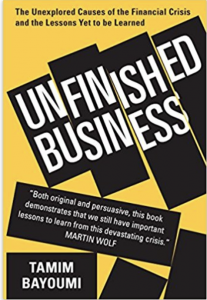
The bubble bursts and its terrible costs

Tammin Bayoumi, is the Deputy Director in the Strategy, Policy and Review Department at the International Monetary Fund, since 1988, who demonstrates that the incompetently regulated European Financial institutions played a major part to inadequately regulated U.S. shadow banking in brining economic calamity to both sides of the Atlantic – and to the entire world.
His penetrating account show how under-regulated trading between European and US banks led to the 2008 financial crisis and how the Euro crisis and U.S. housing crash are intertwined. He also throws some light into the catalytic role played by the European mega banks that exploited the tax regulation to expand into the U.S. market and financed unsustainable bubbles which burst on both continents; U.S. banks have increasingly sold sub-par loans to under-regulated European and U.S. shadow banks and, when the bubbles burst, the losses whiplashed back to the core of the European banking system.
He concludes that the policy makers are ignorant of what still needs to be done to ensure future crises are avoided. He has also been more recently responsible for reviewing Fund policy advice to a wide range of mainly G-20 economies, including Brazil, China, India, Germany and the Euro area and was also been involved in overseeing the Fund’s surveillance strategy, and the work on the Managing Director’s Global Policy Agenda, which summarises both the economic situation and the Fund’s policy advice moving forward.
In addition, he has been closely involved in the Fund’s work on unconventional monetary policy, on monetary policy and financial stability, and on policy toward foreign exchange market intervention. He received a PhD from Stanford University and an undergraduate degree from Cambridge University.
The criticisms of banking policy are particularly strong. Bayoumi details how banks were allowed to hold low levels of capital to create their own risk models to monitor these reserves. Bayoumi reveals how regulators allowed financial assets, backed by mortgage loans, to be classed in such a way as to allow their conversion into cash might require perseverance. This in fact, spurred an alchemy that had deep consequences for the American housing market.
Attempts to co-ordinate major global currencies ended in 1970 with the collapse of the Bretton Woods agreement, and attempts to align European currencies culminated with the creation of the exchange-rate mechanism in 1979. The eventual creation of the Euro and the Black Wednesday in September 1992, when the financial markets lost faith in the credibility of these initiatives. Lack of agreement about how a currency union would promote a broader economic union, and sensitivities around the erosion of national sovereignty, led to weakness in armoury of this union. This created a storm that was a global financial crisis.
European banks as instigators of unsustainable credit growth to the American housing market. The Analysis argues that excessive demand for mortgage-based debt came from the euro area as expanding northern banks created a cross-Atlantic drift into U.S. markets. The change in design have made the euro area better at combating future crises. The creation of the new funds, like the European Stability Mechanism, significantly strengthened the foundations fo the monetary union and expansion of the European Central Bank support to Euro zone through its purchase of government debt for economies in receipt of support, was indeed a game changer.
This books bracing analysis of all that went wrong, is a must read for all bankers and financial institutions.
Unfinished Business: The Unexpected Causes of the Financial Crisis and the Lessons Yet to be Learned by Tammin Bayoumi , Yale University Press £25/$35

